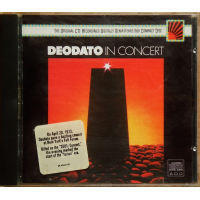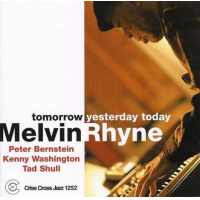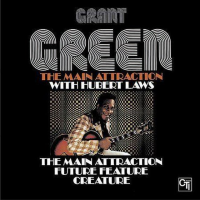Home » Jazz Articles » Liner Notes » One For All: Blueslike
One For All: Blueslike
"This was the first or possibly second time that we did no rehearsing at all and [just] sight read all this stuff on the date," trumpeter Jim Rotondi explains as to the impetuous circumstances surrounding the session. "David Hazeltine actually came to the studio straight from the airport, having been on tour in Japan. Of course, these were all tunes that we either knew or they were tunes that we had done before. It was kind of cool in a way because I think sometimes it's easy to get into a habit of trying to think about the stuff too much and in this case the word 'spontaneous' would definitely apply. Interestingly, the date didn't take us any longer to do than normal. Everybody had their stuff together in terms of the arrangements and copy work so we could just go in and do it."
Of course, not all of the guys had an easy go of it making the scene the day of the recordings (this is where conditions start to become less than ideal). As an added twist, trombonist Steve Davis had to deal with circumstances outside of his control that made just getting to the studio somewhat of an adventure. "It was snowing really hard that day and it turned into a blizzard. I drove down from my home in Hartford as far as Danbury. Then, I had to catch a Metro North to Grand Central, followed by the F train to Brooklyn. My trip took about 6 hours, while normally it's a two and a half to three hour drive to the studio."
The arduous trek to New York notwithstanding, Davis finds that the band's track record allows them to execute things on a dime without too much concern for adverse effects. "That's the great thing about the band," he says. "We're at a point where we don't need to rehearse much at all. Even with new repertoire, everyone knows how to organize the material and construct playable arrangements that bring to the fore our strengths and concepts. This, of course, comes from years of practice, contemplation and working together. "
Truth be told, Davis, Rotondi and tenor saxophonist Eric Alexander have been key contributors to scores of mainstream album dates over the years too numerous to mention, both collectively and individually. As sidemen, their combined experiences include work with Harold Mabern, Curtis Fuller, Ray Charles, Charles Earland, Cecil Payne, and Jackie McLean on a short list. While each one has developed their own distinctive catalogs, they still find it beneficial to work in a variety of contexts as sidemen and as the front line of One For All.
As a rhythm section, one would be hard pressed to come across a more close-knit and cohesive unit than that of pianist David Hazeltine, bassist Peter Washington, and drummer Joe Farnsworth. Speaking of his section mates, Hazeltine has expressed to this writer, "They're my favorite guys to make music with just because of the swing feeling they have." As for Fransworth, who seems to be a ubiquitous member of the 'first call' list these days, David adds, "He's very good at what he does and he's a very good accompanist. In fact, he's one of my favorite cats all around, able to do everything and play in a very supportive role so there's never a war about where the time is."
With the arranging/composing duties split between the horn players and Hazeltine, Steve Davis' "Five Outs To Go" ushers in the sextet's latest installment with an opening fanfare from the horns and a brief statement from Farnsworth. While there's some significance in the fact that the title relates to the opening and closing sections being in 5/4, Eric Alexander gets at the real story behind this intriguing composition. "Stevie D. is such a huge Red Sox fan and this is a clever tribute to the 2003 version of the Sox's yearly swoon. We have a good time messing with Steve about the Sox since the rest of us are Yankees fans." As Davis confirms, "I still had the Red Sox's crushing loss to the Yankees in Game 7 of the ALCS on my mind. Likewise, the title refers to the Cubs' agonizing post-season collapse. Each team was five outs away from going to the World Series and neither one made it."
It's Davis who also pens the arrangement for "We'll Be Together Again," with the melody and punctuating horn lines wafting gently over an Afro-Latin groove. Rotondi carries the main theme with Alexander taking the bridge and in addition to solos from Jim and Steve, Washington gets some space on this one too. Davis, who has a fondness for the Tony Bennett and Bill Evans version of the tune from the '70s, quite simply explains, "It seemed like a nice vehicle to convey the band's sound."
The tempo is way up for "Till There Was You," a standard that's usually taken at a more leisurely pace. In fact, Alexander admits, "I had never thought of doing this as anything but a ballad." Rotondi's arrangement puts Davis in the spotlight with some stop-and-go punctuations from the horns. "I actually had been threatening Steve to write a feature for him on that tune for five or six years now and I finally came up with it for this date," Jim says. "Having been fortunate enough to work with Curtis Fuller on various occasions, we would play the tune "Hello Young Lovers" up tempo and so that was my frame of reference. I really wanted a trombone feature modeled after the way that Curtis would do it because I know Steve and Curtis are good friends."
Although better known through Dionne Warwick's version from 1966 or possibly Stan Getz's take on the line from What the World Needs Now: Stan Getz Plays Bacharach, it was the recent and unlikely pairing of soul singer Ronald Isley and iconic composer Burt Bacharach that brought "In Between the Heartaches" to the attention of Rotondi and Hazeltine. "We both learned about the Isley Meets Bacharach album at the same time and that's where that one came from," declares Jim. Aside from his clever bossa arrangement of the piece, Hazeltine is out front with some typically stimulating solo work.
Serving as the album's title track and centerpiece, the expansive "Blueslike" is a Hazeltine composition that can also be heard on the pianist's Good-Hearted People (Criss Cross 1210). With a repeated bass riff serving as the foundation, this 32-bar structure contains elements of the blues style but is more intriguingly built than the standard 12-bar form. "That tune has been in our book for a long time and for some reason we never recorded it, but it's one we do play on most gigs," Rotondi says. Alexander validates that it's one of the group's favorites and a typically refined piece from Hazeltine's pen. "Dave is truly a wizard arranger and composer and this tune has his signatures all over it with the rhythm section hits and the odd, yet logical movement of dominant 7th chords." Don't miss a particularly incendiary statement from Rotondi, his closing phrase swiftly picked up by Hazeltine who uses it along with his own sagacious quote of Wayne Shorter's "Witch Hunt."
Aside from a few harmony lines and a statement from Davis, "Yasashiku" is a ballad feature for Alexander who tells us its title means 'gently' in Japanese. "I was fooling around with this for many months at the piano before I decided it was ready to be recorded," Eric explains. "It really is based on a very simple progression with just a few harmonic twists thrown in to spice it up. As for the melody, it starts on the 13th of a minor chord which is as far up on the extension ladder as you can go."
The session closes with two of John Coltrane's most enduring compositions, both of which ushered in the saxophonist's "sheets of sound" period and were released on the 1960 Atlantic album Giant Steps. "I wrote the "Giant Steps" arrangement for a gig in St. Lucia that I did with Cedar Walton, Curtis Fuller, Jimmy Cobb, Bobby Watson, and Ray Drummond," says Eric. "This tune is so great as it is, there is very little wiggle room in terms of arranging."
As it turns out, Cedar Walton also happened by chance to be a key element in the inclusion of "Naima." "All of us grew up listening to the version he did on the first Eastern Rebellion record and that album has literally been a model for every one of us," Rotondi says. "It was Joe or Eric who asked him to make a contribution [to our book] because he's a fan of the group and supporter of all of us, individually and collectively, so it was a natural fit." Coming on the spur-of-the-moment, it seems that Walton's arrangement arrived on site just in time for its debut. "Cedar actually faxed us that arrangement in the studio, [but] they had one of those old fax machines at the studio that has rolls of paper rather than sheets and so it came out all on one long piece of paper," Jim explains with a chuckle. "We had to dissect it to see what was happening."
They say familiarity breeds contempt, but in the case of the six gifted gentlemen that comprise One For All it yields nothing but affirmative results and the group's shared experiences have allowed them to take it to the next level on Blueslike. "It's no rocket science, just good challenging music that you can instantly interpret," Davis asserts. "Hopefully, the end result is pleasing to our listeners."
Liner Notes copyright © 2026 C. Andrew Hovan.
Blueslike can be purchased here.
Contact C. Andrew Hovan at All About Jazz.
An avid audiophile and music collector, Chris Hovan is a Cleveland-based writer / photographer / musician.
Track Listing
Five Outs To Go; We'll Be Together Again; Till There Was You; In Between The Heartaches; Blueslike; Yasashiku; Naima; Giant Steps.
Personnel
One for All
band / ensemble / orchestraJim Rotondi
trumpetEric Alexander
saxophone, tenorSteve Davis
tromboneDavid Hazeltine
pianoPeter Washington
bassJoe Farnsworth
drumsAlbum information
Title: Blueslike | Year Released: 2004 | Record Label: Criss Cross
Tags
About One for All
Instrument: Band / ensemble / orchestra
PREVIOUS / NEXT
Support All About Jazz
 All About Jazz has been a pillar of jazz since 1995, championing it as an art form and, more importantly, supporting the musicians who make it. Our enduring commitment has made "AAJ" one of the most culturally important websites of its kind, read by hundreds of thousands of fans, musicians and industry figures every month.
All About Jazz has been a pillar of jazz since 1995, championing it as an art form and, more importantly, supporting the musicians who make it. Our enduring commitment has made "AAJ" one of the most culturally important websites of its kind, read by hundreds of thousands of fans, musicians and industry figures every month.



























